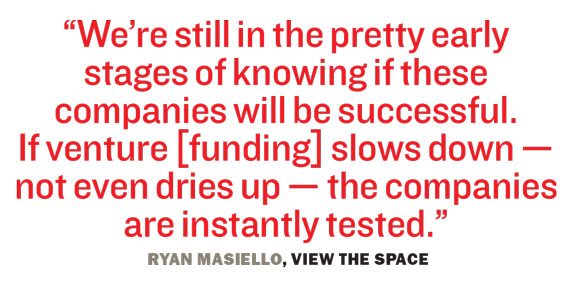 From ride-sharing apps to fantasy-sports operators to e-commerce retailers, the city’s roster of office tenants looks a lot different these days than it did just a few years ago. Indeed, venture funding and billion-dollar valuations are increasingly propelling fledgling businesses with niche services into the market.
From ride-sharing apps to fantasy-sports operators to e-commerce retailers, the city’s roster of office tenants looks a lot different these days than it did just a few years ago. Indeed, venture funding and billion-dollar valuations are increasingly propelling fledgling businesses with niche services into the market.
And this new batch of tech start-ups is increasingly claiming sizable New York City office spaces to accommodate its accelerating growth.
In many cases these companies are inking deals for new space shortly after securing millions in venture funding from blue-ribbon investors.
Fantasy-sports startup FanDuel, for example, signed a 41,000-square-foot lease at Rockrose Development’s 300 Park Avenue South in September, just two months after getting a $275 million cash infusion from Google and Time Warner, among others, in a Series E funding round.
But no matter how many hot startups flood the market, some landlords remain wary about leasing space to a young company.
“We’re still in the pretty early stages of knowing if these companies will be successful,” said Ryan Masiello, a former JLL broker who founded the cloud-based leasing platform View the Space. “If venture [funding] slows down — not even dries up — the companies are instantly tested.”
Due diligence
Some landlords are outright unwilling to sign deals with less-established tenants. Empire State Realty Trust Chair and CEO Tony Malkin, for example, told a crowd in June that his company “won’t lease to WeWork,” the office-sharing start-up now valued at $10 billion, and that his company is “insulating” itself from tenants catering to a “part-time” workforce.
“When these companies grow up, they’ll want a real building and a real landlord,” he said. “They’ll need to get to meetings.”
While office-sharing tenants are just a small sliver of the tech and start-up world, other landlords are ramping up their due diligence when it comes to vetting these tenants.
Savills Studley’s Greg Taubin — who has represented BuzzFeed, Quirky and software firm MongoDB — said he advises his tenant clients to open their financial books to landlords to ease their concerns.
“A tenant’s credit will always be the hot button for a landlord, especially for a tech or start-up company,” Taubin said. “Despite raising significant funds, the key is the company’s overall cash flow because landlords carefully examine the financials.”
In addition, security deposits of up to 12 months and letters of credit remain “extraordinarily important” to landlords, Masiello said.
 Landlords also often require a larger security deposit when dealing with young start-ups. In many cases, these tenants are forced to lay down much of their Series A and B funding. “It’s a large chunk of money to securitize space, and that’s a tough pill to swallow,” Masiello said.
Landlords also often require a larger security deposit when dealing with young start-ups. In many cases, these tenants are forced to lay down much of their Series A and B funding. “It’s a large chunk of money to securitize space, and that’s a tough pill to swallow,” Masiello said.
ABS Partners Real Estate’s Alan Friedman — who represented photo-memory app Timehop in a deal for 4,100 square feet in Tribeca in July — said the issue for landlords is not with billion-dollar tenants like WeWork. (Empire State Realty Trust is an exception.) It’s with the lesser-known firms. He said there are key financial signs indicating whether a tech company has staying power.
“If the security deposit is having a severe impact on the company’s ability to operate, it’s probably not the best tenant to work with,” he said.
Risky business
No matter how diligent a landlord is, it’s still tricky to predict a potential tenant’s success.
Steven Durels, executive vice president and director of leasing at SL Green Realty — the largest commercial landlord in the city — said he targets companies in the operating stage rather than the fundraising stage.
But it’s more of an art than a science because that is not always a perfect gauge either.
Landlords’ caution is not unfounded. Some start-ups have flamed out early and suddenly.
After launching in 2009, New York-based Quirky — an invention platform — took 5,500 square feet in Noho. Two years later, the company moved to a 27,500-square-foot space at Waterfront New York Realty’s Terminal Stores complex in Chelsea and soon expanded to about 60,000 square feet.
But in July, Quirky announced plans for layoffs amid fundraising struggles. With about eight years left on the lease, Quirky filed for Chapter 11 bankruptcy last month and disposed of the 60,000-square-foot space.
“Things were going well,” said Taubin, who brokered Quirky’s lease in Chelsea, as well as the lease on its San Francisco headquarters. “But then the brakes were put on, and we had to take immediate action. The best move was to release them of liability.”
Brokers say start-up firms’ preference is for leases that can accommodate their space needs one to three years into the future. That means they are often looking for leases of two or five years, instead of 10, which landlords typically seek. In another common scenario, the start-up tenant takes a larger space but subleases a portion of it until they hire more staff.
DraftKings, a Boston-based billion-dollar fantasy sports start-up, is considering subleasing nearly half of its new 23,500-square-foot space at investor Alvin Flaster’s 400 Lafayette Street.
ABS’ Jay Caseley, who represented Flaster in the deal, said the landlord did not have a problem with the arrangement.
“We get guys who don’t even tell us they want to share desk space,” he said. “When it’s a surprise, it bothers the landlord. We appreciate those, like DraftKings, that are transparent about it.”
But some landlords say having tenants sublease in that fashion is risky.
“What happens if a tenant can’t sublet? Can they make the rent?” said Leslie Himmel of Himmel + Meringoff Properties, which owns seven Manhattan office buildings.
Himmel — whose firm recently signed a 10-year lease with information-discovery company Dataminr for more than 30,000 square feet at 6 East 32nd Street — said her team makes sure it understands the start-up’s growth plan.
“We’re a believer in tech companies. We look in their eyes,” Himmel said, “and we look carefully at the [profit and loss statement].”
Durels said he’s not worried about tech firms creating problems for the Manhattan office-leasing industry
“What’s healthy about the Manhattan office leasing market is we’re not dependent on one industry,” Durels said. “If tech were to slow down, some other industry will take that slot.”